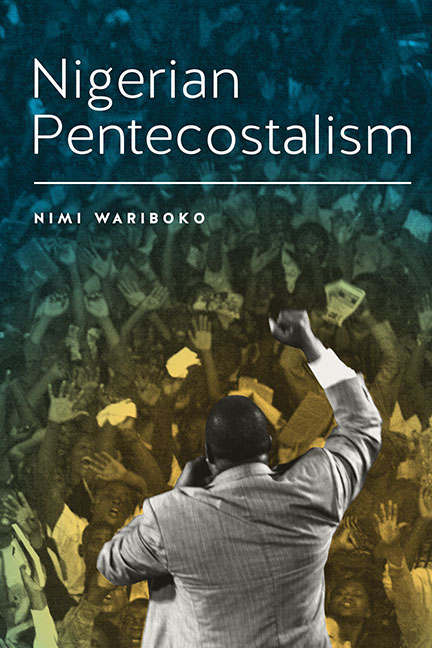Book contents
- Frontmatter
- Dedication
- Contents
- Foreword
- Preface
- Acknowledgments
- Introduction
- Part 1 Origins and Spirituality of Nigerian Pentecostalism
- Part 2 Ethical Vision of Nigerian Pentecostal Spirituality
- 6 Politics: Between Ontology and Spiritual Warfare
- 7 Miracles, Sovereignty, and Community
- 8 Altersovereignty and Virtue of Pentecostal Friendship
- 9 Spirituality and the Weight of Blackness
- 10 “This Neighbor Cannot Be Loved!”: Invisibility and Nudity of the “Pentecostal Other”
- 11 Pentecostalism and Nigerian Society
- Notes
- Bibliography
- Index
7 - Miracles, Sovereignty, and Community
from Part 2 - Ethical Vision of Nigerian Pentecostal Spirituality
Published online by Cambridge University Press: 15 March 2018
- Frontmatter
- Dedication
- Contents
- Foreword
- Preface
- Acknowledgments
- Introduction
- Part 1 Origins and Spirituality of Nigerian Pentecostalism
- Part 2 Ethical Vision of Nigerian Pentecostal Spirituality
- 6 Politics: Between Ontology and Spiritual Warfare
- 7 Miracles, Sovereignty, and Community
- 8 Altersovereignty and Virtue of Pentecostal Friendship
- 9 Spirituality and the Weight of Blackness
- 10 “This Neighbor Cannot Be Loved!”: Invisibility and Nudity of the “Pentecostal Other”
- 11 Pentecostalism and Nigerian Society
- Notes
- Bibliography
- Index
Summary
If body politic did not bend bodies, if bodies did not bend to create a politique de lieux, if bodies did not submit to body politic, would a theology of sovereignty be possible? Would a theiology be possible?
Introduction
In the last two chapters I examined the Pentecostal conception of the body and its connections with the notions of body politic and the political. The body is conceived in dualistic terms (physical and spiritual, visible and invisible), and this view is mapped onto the body politic and the political. I also showed that the Pentecostal conception of politics is both ontological (about being) and ethological (about being-together). In this chapter I want to examine the potentials of Nigerian Pentecostalism to found a community, a polis, a political community of believers. This is a concern that has recently preoccupied scholars. Political scientist Ruth Marshall leads the effort among those writing on Nigerian Pentecostalism. Her provocative analyses of subjectivity, truth, and lack of sovereignty for instituting a postrevolutionary Pentecostal polis in Nigeria commands attention.
Marshall argues that there is little or no chance for Nigerian Pentecostalism to found a genuine community of believers who can be mobilized for social or political programs. According to her, the Pentecostal movement is characterized by excessive fragmention, unhealthy orientation to miracles, and a troubling disavowal of any form of sovereignty that can hold together the variety of individualistic, independent subjects of God.
I disagree with Marshall's assessment that Pentecostalism cannot institute a political order. She reached her conclusion through a well-meaning, yet faulty, deployment of the notions of sovereignty, community, and miracles in the interpretation of the prospects of Nigerian Pentecostalism. I will argue that the ongoing Pentecostal revolution in Nigeria has the potential to found community and institute sovereignty over it. To grasp and properly evaluate this potential, we have to rework the inherited wisdom concerning community, sovereignty, and miracles. We have to rethink these terms in the light of virtue ethics as it relates to practices of moral excellences that can found, sustain, and legitimate a Pentecostal community or political order.
- Type
- Chapter
- Information
- Nigerian Pentecostalism , pp. 166 - 200Publisher: Boydell & BrewerPrint publication year: 2014

